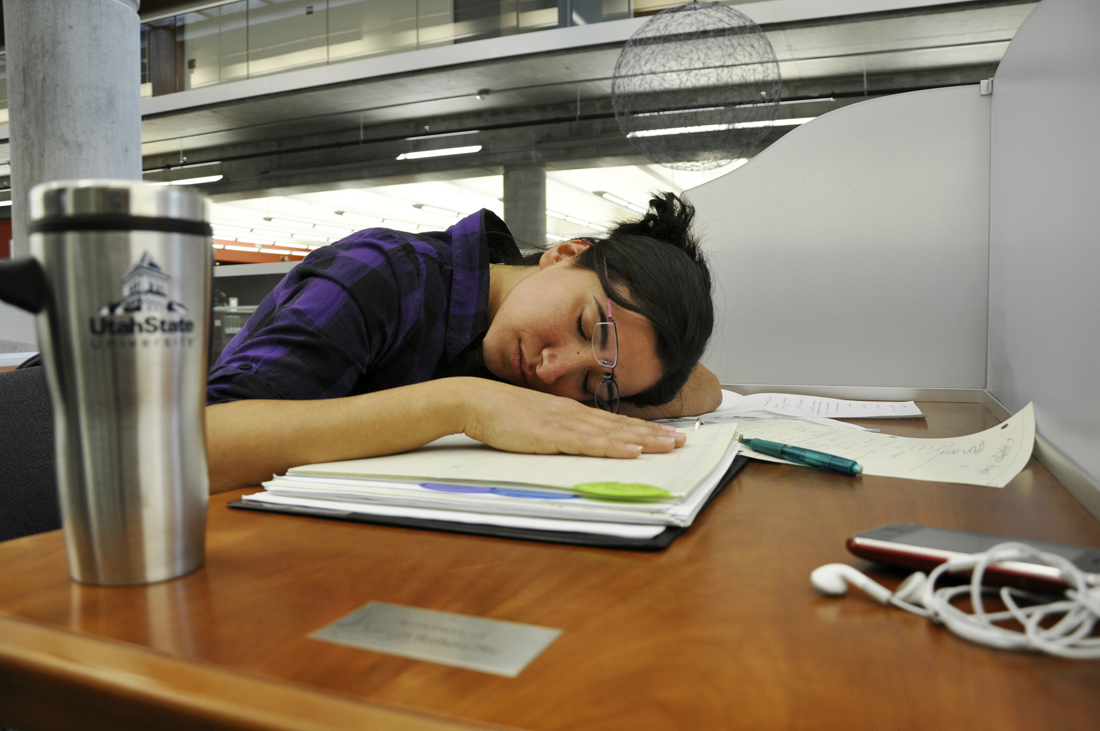Learn how to get the most out of your sleep
It’s the night before a big exam: one student stays awake cramming information into his brain for hours on end, and another studies for an hour or two and spends the night in snoozeville. Who does better on the test?
Dr. Kerry Jordan, assistant professor of psychology, says that sleep deprived students are often more confident about their performance on exams after a night full of cramming, but just the opposite is true.
“Sleep deprived students often do more poorly on exams, but are more confident that they did well,” Jordan said.
Students who have been up all night cramming feel like they know more because of the extra time they spent studying, but without sleep, the information is not retained as well.
“The best thing a student can do is get a full night of sleep before an exam,” said Tom Berry, a staff psychologist and internship coordinator for USU’s Counseling and Psychological Services. Berry said studying for an hour and a half and then getting a full night of sleep actually increases test performance.
Sleep is a vital, everyday task that some people feel like they can go without, but the repercussions of sleep deprivation can sometimes prove fatal.
“Studies have shown that going 16 hours without sleep can make a person’s driving equal to that of being legally intoxicated,” Jordan said.
Performance on other easy and sometimes monotonous tasks, such as recalling memories, suffer as well. The impacts of going without sleep can also make one more irritable and leave them feeling physically drained.
Humans go through stages known as the sleep cycles, according to the USU Health Services website. If one wakes in the middle of a deep sleep cycle, he or she is more likely to feel drowsy or tired all day because his or her sleep cycle was not fully finished.
In order to complete a cycle, the brain moves into REM, or rapid eye movement, sleep, which is the state where most dreaming and the deepest levels of sleep occur.
Jordan says that the REM and deeper sleep phases are the last stages of the sleep cycle. Waking up before the cycles are over is more difficult and can make one feel more tired.
She also says these are the phases that are needed the most. Once the brain has been deprived of REM sleep, it will do what is called a “rebound effect.” The brain will try to slip back into those deep sleep cycles faster than a normal sleep cycle, proving that the brain needs REM and deep sleep cycles to rest.
“College students are constantly playing fast and loose with their sleep,” Berry said. Students often do not get the right amount of sleep or try to wake up in the middle of sleep cycles.
“When a student sleeps through (his or her) alarm, it’s more than likely that (he or she) is at the bottom of the sleep cycle,” Berry said.
To help develop a better sleep cycle, USU’s health services website suggests going to sleep and waking up around the same time every day. This helps the body’s inner clock develop a daily rhythm.
Also, try to limit napping during the day because it can fragment your sleep rhythm as well. If a nap is necessary, try to nap for under an hour and before 3 p.m.
To help students learn more about sleep, Berry, with Counseling and Psychological Services, will be putting on a seminar titled “Getting the Most out of Your Sleep.”
Berry will discuss how to manage sleep and make the most out of the time that one has to sleep.
“College folks need around nine hours, which would be six sleep cycles,” Berry said. “A sleep cycle is, on average, an hour and a half, so if a student can’t get nine hours, we encourage them to cut back to seven and a half so it’s easier to wake up.”
The seminar will also teach students how to deal with chronic sleeping problems, difficulty falling asleep, and sleep quality.
Students will also learn how sleeping issues can sometimes be linked to anxiety or depression. At the end of the seminar, there will be a brief question and answer period for personal sleep issues.
“Sleep is so foundational. If (students) are not getting good sleep, everything else a college student has to do becomes harder,” Berry said.
“Getting the Most out of Your Sleep” will be held Tuesday, Oct. 19, in TSC room 310B from 5:30 to 6:30 p.m. The seminar is open to all students. To reserve a seat contact call 797-1012 or stop by TSC 306.
-nikki.lives6@aggiemail.usu.edu

